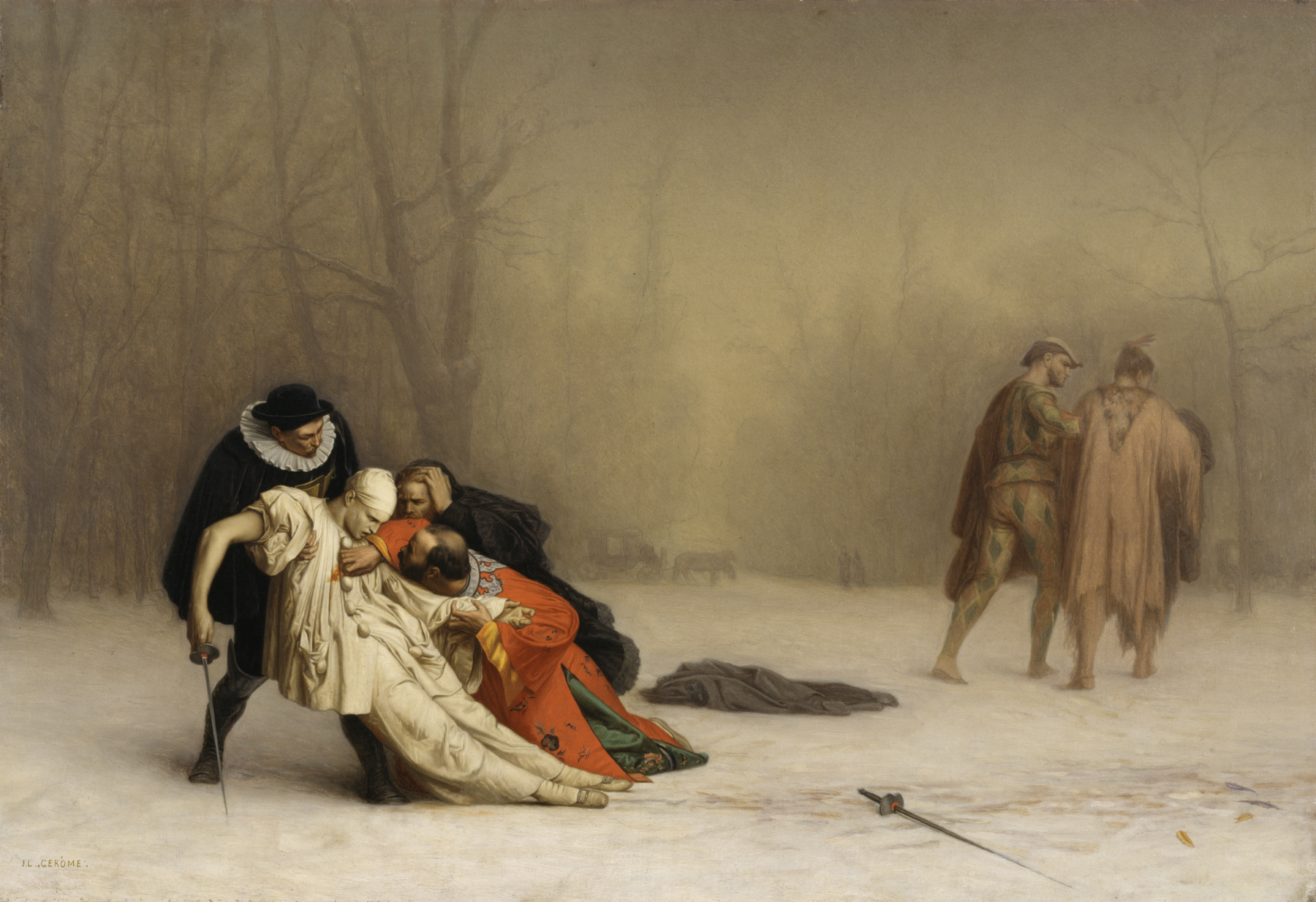A Word on France: Charlie Hebdo and Jeremy Scahill
 Tuesday, January 13, 2015 at 05:10AM
Tuesday, January 13, 2015 at 05:10AM Man is certainly stark mad; he cannot make a worm, and yet he will be making gods by dozens.
-Montaigne

The Duel After the Masquerade, Jean-Léon Gérôme
As most of Paris mourns and some take reprisal actions against the general Muslim community who had nothing to do with last Wednesday’s Charlie Hebdo attacks, it’s important to take a step back and consider events in a broader historical, geographic, and demographic perspective. It is worth noting that the number of people killed in Paris is substantially less than those killed in less stable and affluent areas of the world around the same time last week. On the same day as the Paris killings, upwards of thirty people were killed at an attack on a police academy in Yemen. Also last week, Boko Haram militants carried out an attack in Baga, Nigeria which killed hundreds, possibly 2,000 people. Over the weekend, the United States carried-out over thirty airstrikes in Iraq and Syria, where a purported fifty civilian prisoners have been killed in an airstrike which took place on December, 28th.
In response to the attacks, thousands of French military forces have been dispatched to watch over what can already be classified as a surveillance-state. There is no question that, just like the US and UK, civil liberties and privacy rights will be rolled back in France. Western military forces will increase drone strikes in the Middle-East and deprived individuals inspired by the Paris attacks and embittered by the drone strikes will opt to become martyrs. The cycle of revenge killings, revenge drone strikes, and Islamophobia shall continue until sensible people take control of the governments and militaries of the western world. As Jeremy Sachill points out, it is almost laughable that the leaders of certain western states that have prosecuted whistleblowers and killed journalists partook in the French unity march in defense of freedom of speech. The heads of state from Israel, Egypt, Gabon, the UK – countries which have all targeted journalists – participated in the march.
Despite all the fear-mongering broadcast throughout mainstream media, the death rattle has yet to manifest. In 2012, murder rates in France were at their lowest (430 murders) in history, which is progress for a country which, like most others, has emerged from an extremely bloody past. I have a feeling that just as we do not hear too much about ISIS and Ebola right now (Until those items made headlines, I thought Ebola was a country and that ISIS was an ice cream sandwich), mainstream media will soon turn our attention elsewhere. Yet regardless of where the spotlight falls, it will involve a group of people who will be portrayed as non-people. They will show us these people and say, “Look at these animals, you must fear them, you must hate them.” There is too much hatred in the world right now, and it must be rejected.
In a Democracy Now interview yesterday, Jeremy Scahill provides an excellent answer in response to a question raised by freedom-fighter extraordinaire, Amy Goodman:
AMY GOODMAN: How do they prepare for future attacks?
JEREMY SCAHILL: Well, I mean, the discussion you would hear on big corporate television about that is going to be about how do we defend our society, how do we integrate these networks, how do we do surveillance on these people. You know, this is probably going to be an unpopular thing to say, but I’ll say it because I believe it: The only way I think we’re ever going to effectively be able to confront this kind of terrorism is to take away the justification or the motivation of people who are not already sort of committed radical individuals who believe that what they’re doing is justified and they’re not afraid to die.
You know, this is probably going to be an unpopular thing to say, but I’ll say it because I believe it: The only way I think we’re ever going to effectively be able to confront this kind of terrorism is to take away the justification or the motivation of people who are not already sort of committed radical individuals who believe that what they’re doing is justified and they’re not afraid to die.
You know, the Taliban fighters always say, you know, "We love death as much as you love life." But a lot of these people who do these attacks, something happened in their life somewhere—similar to what happens with school shootings here, you know, what happened at Columbine. I liken a lot of these guys to people who go through some kind of period where they’re lost in life, and then they’re falling. Who catches you when you fall? A lot of times in a society that’s been decimated, a religion that’s been humiliated, people are looking for some kind of greater meaning, and there are a lot of people willing to take advantage of them.
But in a broader sense, what we’ve done since 9/11, and actually going back well before 9/11, with the unquestioning support for Israel, with the drone bombing campaigns, with the invasions and occupations of countries, with the torture of prisoners around the world, we have projected a message that we are at war with a religion. When Rupert Murdoch, the most powerful media figure in the world, goes on Twitter and uses the word "Moslem," but says that basically all Muslims are to blame for this until they stop it, that’s not lost on people around the world. And Bush used the word "crusade" in the early stages of the post-9/11 aftermath. So, I’m not saying that any of this is justified as a result of U.S. policy. But if we really want to confront this, we have to understand our own role in legitimizing it.
 Aaron |
Aaron |  Post a Comment |
Post a Comment | 
Reader Comments